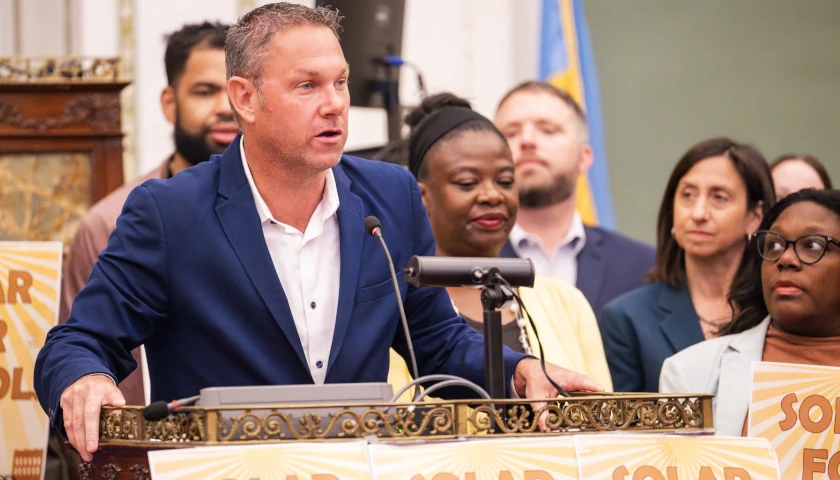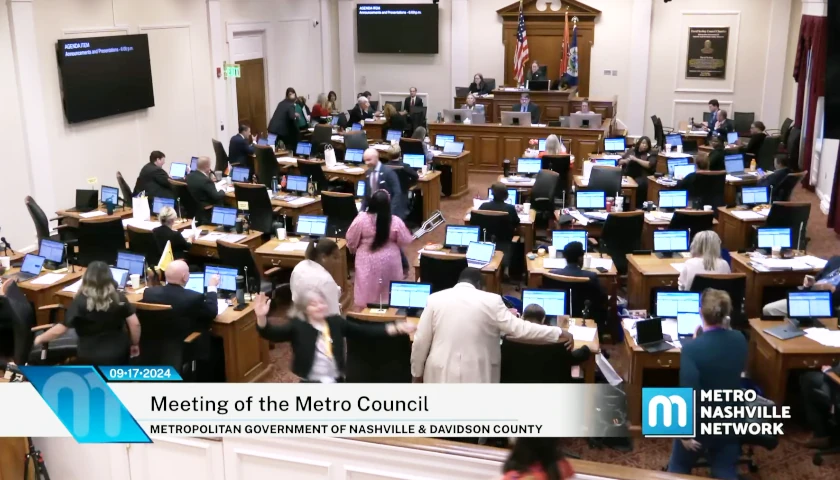Live from Nashville, Tennessee, Tuesday on The Brian Wilson Show – host Wilson welcomed Tennessee House of Representatives Speaker Cameron Sexton to the newsmaker hotline to discuss the expulsion proceedings of Democrat Representatives Justin Jones and Justin Pearson.
Wilson: Right now joining us on the Newsmaker hotline is the speaker of the Tennessee House, Cameron Sexton.
Mr. Speaker, I appreciate you coming on. I have a few questions about this whole thing.
Can you just explain to me and to the audience how this thing started out as “We’re going to expel them”?
When it was – think it’s gotta be clearly understood – they were probably gonna come back, and you were gonna have to reseat them.
Sexton: Yes. I’ll try my best.
So, part of the problem, too, but I’ll discuss it as best I can, is, we’ve been threatened with litigation, so some things based on what the AG’s told me, we’ll have to refrain from talking about.
But to answer, when the actions took place on the house floor, we’re very limited as a body, inside the body, on the things that we can do.
We can do a censure, or we can do an expulsion. Those are the two options that the body can take. And so the first question you have to ask yourself – regardless of anything that you think, whether or not they could reseated, win a general election, win a special election, win a primary – regardless of all that, the first question you have to ask yourself is: [Of] the two things that we have as a body: censorship or expulsion, what did their actions make you think the consequence should be?
And then you have to go down that road.
The body felt like, that their actions on the House Floor rose to the level of expulsion, and so that’s the decision that the body made.
But I don’t think that you would want us to make a decision based on what may or may not happen after that. It should be based on what you think the consequences are and what level you thought it rose to, and make a determination based on that, because we’re having to set a precedent on behavior, disruptive behavior on the House Floor.
If you kept it at censure, if that’s where your audience wants to go, then you’re saying, “What that is, is a censure.”
So what has to happen to get to expulsion?
If you say that you thought it went to the level of expulsion, then that’s where you’re setting at the level of disruptive behavior being expulsion.
Wilson: But any good politician always tries to think of, “what’s the end game here?”
What is going to be the reaction of our action? How will they respond?
Did you have a conversation with the Attorney General before the expulsion that said, “What if they send [them] back? What are our options?”
Did you have that conversation?
Sexton: I can’t go into details because of litigation, but what I can tell – potential litigation – but what I can tell you is you have to think about –
Say that there’s a special election, right? So you’re gonna have to assume that a special election they may or may not qualify for, but there’s a special election as well.
So at that point, the decision truly is about setting a precedent for the House Floor.
So if you’re looking at some representatives may have and said, “Well, they’re just gonna come back, so I’m not gonna expel them.” In my mind, that’s not the right way to look at it.
The right way to look at it is to say, “What level of offense does this come to? What are our options? Where do we need to set it?”
They were going to use any vote that you had to do whatever they wanted, whether it was a censure, whether it’s an expulsion, rather than it’s whatever. And then the secondary problem is, then they would in potentially increase their action on the House Floor, because that level didn’t get to a level of expulsion.
So what would happen to get to that level again? Do it a second time?
Yes, do it more, then?
So I get it, there’s a lot of people who are frustrated. I get, there’s a lot of people saying, you know, about them being reappointed, but it truly was about discussing the actions on the House Floor and what level does that go to in trying to make that decision the best you can.
Wilson: But let’s talk about the practical result of what has happened.
You expelled them, they became martyrs in the public eye and, and look, in fairness, I will tell you the mainstream media lied about this story to the point where they, the American people, did not get the straight answer.
They were told that, you know, that we’re racist. They were told that, you know, that, we were trying to, squelch free speech. And I know because I know all the details of this story. That wasn’t what happened. But that’s the, that’s the story that went out.
So they become martyrs immediately, and many Americans now look at Tennessee as a place where free speech is squelched and the state legislature is run by a bunch of white supremacists. They believe that because that’s what they’ve been told.
Did, did we not foresee that this was going to happen at the end of the day?
That, that they were gonna come back? He’s stronger now than he was when he left.
Sexton: In some people’s eyes. But what I can tell you, too, though is, is the exact same thing you talked about, would’ve been the same under censure. It would’ve been the same argument. It would’ve been, they wouldn’t have been expelled, but it was.
We, we didn’t get to exercise our, our freedom of speech. We did something that we thought we needed to do, and they censured us for the exact same reasons and the only reason —
Wilson: But a censure – the difference between a censure and an expulsion is like the difference between night and day. I mean, a censure is a rap on the knuckles, basically.
Expulsion means that you’re taking an action to remove them from the body. I mean, there’s a lot of distance between those two actions.
Sexton: Well, there is, and that’s where there needs to be further conversations about in the future, do we need to clarify anything to give you a middle road?
Maybe those two are on the, on the two sides and there’s no middle ground to go to.
But once again, you can’t, I don’t think you can make a decision. I mean, you can look at it and say, Hey, you’re gonna make them this, or you’re gonna make them that. At the end of the day, I don’t think that should influence what you think should happen.
You either think it rises to the level of censure or you think it rises to the level of expulsion. You can’t look at it and say, well, if we expel, then this is what’s gonna happen. So we don’t want that to happen, so let’s just do something less because of what may happen in the future.
Well, I don’t think you can look at it that way.
Wilson: Well, the irony of this situation is that you are being accused, now, of being someone who is against the democratic process, that you have tried to squelch the Democrat process by the actions that you took.
The real truth of the matter is they were trying to squelch the Democrat process by shutting down the floor of the House, but that’s not getting out there.
I’m wondering, what can be done now to correct the impression that has been left by this because I’m guaranteeing you, it, it really has hurt the reputation of your body and I think the state of Tennessee’s reputation as well.
Sexton: It could have, but what I can tell you is we’ve been hearing from a lot of people back home and in districts when members went back this last weekend, it wasn’t to the level that you’re talking about.
And so what members are talking about is, is it outside the state? Is it in the beltway here in Nashville?
Who are the people who are talking to us from outside the state? I mean, I know that there’s our members who are getting hate messages from people from other states who are very much progressives when you look them up.
And, so you look at it and you’re like, unfortunately for us, there it seems like that the Republicans and conservatives weren’t as vocal about this as were the progressives, and they were very well organized and they have delivered a message that’s out there.
The unfortunate thing, I think, is I voted for Gloria Johnson [to be expelled] and when she did not get expelled, that changes the narrative as well.
Wilson: Yes, it did. It really did. Are you surprised that she got basically a pass because that turned it into a very racial thing, didn’t it?
Sexton: Well, yeah, I mean–
Wilson: I mean, if anybody wanted to exploit that, you know–
Sexton: What she did when she walked out of the room, and she absolutely knew that that was not the case, but that didn’t stop her from saying it.
And, and that’s what the national media wanted to pick up on, and that’s what they ran with.
But, it was disappointing because she was an active participant and she was up there. She stood up there the whole time and she joined them.
Nobody, none of ’em are saying, “Who is the one that organized it? Who set it up? Whose idea it was.”
They all said that they were three participants. Representative Johnson argued that she did less than they did, but that’s not really an argument. You still participated.
And so in my opinion, you should have been expelled, too, and we came one vote.
Wilson: Very quickly, Jones and Johnson were stripped of their committee assignments before they were expelled. Are those committee assignments still stripped?
Sexton: The, the policy I’ve had in the House since I’ve been Speaker, whether it’s been Republican or Democrat members who have been appointed by their local governing body, I have treated them all the same.
If you’re appointed, you’re not on any committees until you’re elected. That was the policy that we’ve put in place in the beginning, and that’s what we’ve been following.
Wilson: So the answer is until elections are held, to make this a permanent decision, they do not have committee assignments.
Sexton: Correct. And that’s been the policy for Republicans and Democrats alike.
Wilson: Just breaking right now a story that’s just been posted on The Tennessee Star. The headline says, “Former Obama AG Eric Holder Threatened Legal Action in Letter to TN House Speaker Sexton Unless Expelled Democrat Legislators Let Back In; Sources Say Litigation Still Likely.”
Can you confirm the letter even though if you can’t talk about the details?
Sexton: I know there’s a letter that was sent. I think Representative Jones read some of the things on the floor last night. But, there was a letter that was sent, I haven’t read it yet.
I know the AG has have it and is aware of it. Um, that letter came in, I think after the fact – after the expulsion sometime this week, I don’t know the exact time – but Representative Jones is represented by Eric Holder as his attorney.
Wilson: All right. And that generally would be a civil rights case, right, is what they might threaten?
Sexton: I don’t know at this point. You know, we’re waiting and seeing, and the AG is on top of it. And my understanding is with the AG, the statute of limitations is probably about a year. So we’ll see what happens.
Wilson: If you had to do it all over again, would you do it differently?
Sexton: No, I think their actions should have been expelled and that’s what I think.
Wilson: I think a lot of people agree with that, but I think a lot of people also felt that you should have stood your ground and not reseated them.
Sexton: Well, I mean, as I said, I understand that. I can’t get into the details of that, but what I can tell you is, is if we want to go through that scenario, that would have been – we are 12 months.
We’re more than 12 months away from the next election cycle, which means you have to have a special election sometime early fall of this year, right, Brian? We all agree on that. Right. Okay.
What we also know is if there’s any suit filed, it has to go to Davidson County and not the three panel court, okay?
So you have a court case that goes to Davidson County. And then the question, Brian, that people will have to answer is, if you did that, would the decision by the courts – whether you win in Davidson, or win in courts of appeals, or vice versa, or both – would that be done by the time you would have the special election as well?
Wilson: I see. All right. Well, Mr. Speaker, you’re an awful good guy to come on and answer these questions after I hammered on you pretty hard earlier in this program. But I appreciate you coming on and trying to explain how this thing all went sideways and what the thinking was behind it – even if there are some limitations on the things that you can and cannot say.
I appreciate that very much.
Sexton: Thank you.
Listen to the full interview here:
– – –
Photo “Cameron Sexton” by Cameron Sexton. Photo “Brian Wilson” by Brian Wilson.





